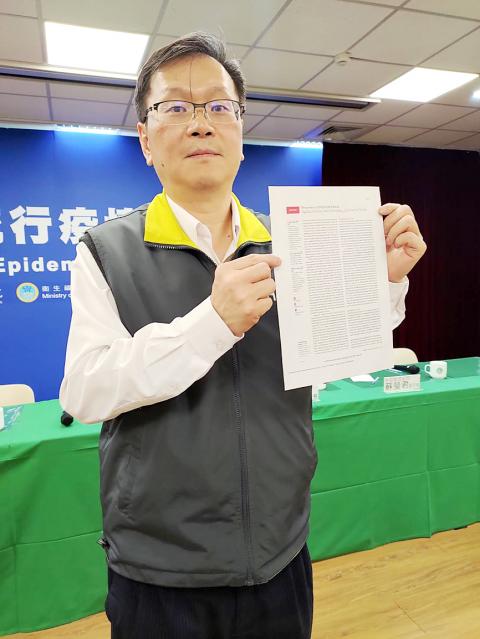A paper published in the latest issue of JAMA: The Journal of the American Medical Association praises the government’s response measures to COVID-19, Centers for Disease Control Deputy Director-General Chuang Jen-hsiang (莊人祥) said yesterday.
The paper, authored by C. Jason Wang (王智弘), an associate professor of pediatrics and director of Stanford University’s Center for Policy, Outcomes and Prevention, introduces Taiwan’s response measures to the coronavirus from three aspects: big data analytics, new technology and proactive testing, Chuang told a news conference at the Central Epidemic Command Center (CECC) in Taipei.
Taiwan was expected to have the second-highest number of COVID-19 cases due to its close proximity to China, the large volume of cross-strait air traffic, the 850,000 Taiwanese residing in China and its 2.71 million Chinese visitors last year, the paper says.

Photo: Wu Liang-yi, Taipei Times
However, Taiwan has been on constant alert and ready to act on epidemics originating from China since the SARS outbreak in 2003, it says.
The paper only includes information up to Feb. 24, when only 30 confirmed cases had been reported in Taiwan, which then had the 10th-highest number of cases among nations affected by the coronavirus, Chuang said.
With 42 confirmed cases as of yesterday, Taiwan is 16th in number of confirmed cases among affected nations, demonstrating that its ranking has fallen amid a number of outbreaks worldwide, he said.
Taiwan was quick to recognize and manage the crisis, implementing border control, case identification, containment and resource allocation measures, as well as frequently communicating with and educating the public while fighting misinformation, the paper says.
The paper introduces the CECC and its actions, including conducting onboard health assessments of passengers on direct flights from Wuhan, China — the epicenter of the epidemic — from as early as Dec. 31 last year and recording people’s travel history in the National Health Insurance system, which has allowed physicians to identify high-risk people.
The CECC has also controlled the allocation and price of masks, used government funds to increase mask production and held daily media briefings to reassure and educate the public, it says.
“Understanding the action items that were implemented quickly in Taiwan and assessing the effectiveness of these actions in preventing a large-scale epidemic may be instructive for other countries,” the paper says.
“Although we still face many challenges ahead as the battle against COVID-19 continues, we are grateful that the academic wrote the paper to allow the world to know the efforts being made in Taiwan,” Chuang said.

The manufacture of the remaining 28 M1A2T Abrams tanks Taiwan purchased from the US has recently been completed, and they are expected to be delivered within the next one to two months, a source said yesterday. The Ministry of National Defense is arranging cargo ships to transport the tanks to Taiwan as soon as possible, said the source, who is familiar with the matter. The estimated arrival time ranges from late this month to early next month, the source said. The 28 Abrams tanks make up the third and final batch of a total of 108 tanks, valued at about NT$40.5 billion

A group from the Taiwanese Designers in Australia association yesterday represented Taiwan at the Midsumma Pride March in Melbourne. The march, held in the St. Kilda suburb, is the city’s largest LGBTQIA+ parade and the flagship event of the annual Midsumma Festival. It attracted more than 45,000 spectators who supported the 400 groups and 10,000 marchers that participated this year, the association said. Taiwanese Designers said they organized a team to march for Taiwan this year, joining politicians, government agencies, professionals and community organizations in showing support for LGBTQIA+ people and diverse communities. As the first country in Asia to legalize same-sex

Travel agencies in Taiwan are working to secure alternative flights for travelers bound for New Zealand for the Lunar New Year holiday, as Air New Zealand workers are set to strike next week. The airline said that it has confirmed that the planned industrial action by its international wide-body cabin crew would go ahead on Thursday and Friday next week. While the Auckland-based carrier pledged to take reasonable measures to mitigate the impact of the workers’ strike, an Air New Zealand flight arriving at Taipei from Auckland on Thursday and another flight departing from Taipei for Auckland on Saturday would have to

MOTIVES QUESTIONED The PLA considers Xi’s policies toward Taiwan to be driven by personal considerations rather than military assessment, the Epoch Times reports Chinese President Xi Jinping’s (習近平) latest purge of the Chinese People’s Liberation Army (PLA) leadership might have been prompted by the military’s opposition to plans of invading Taiwan, the Epoch Times said. The Chinese military opposes waging war against Taiwan by a large consensus, putting it at odds with Xi’s vision, the Falun Gong-affiliated daily said in a report on Thursday, citing anonymous sources with insight into the PLA’s inner workings. The opposition is not the opinion of a few generals, but a widely shared view among the PLA cadre, the Epoch Times cited them as saying. “Chinese forces know full well that